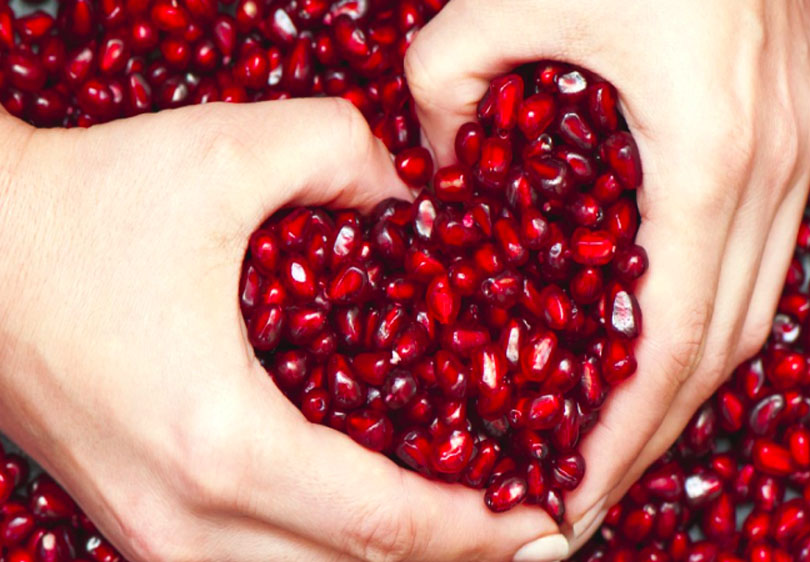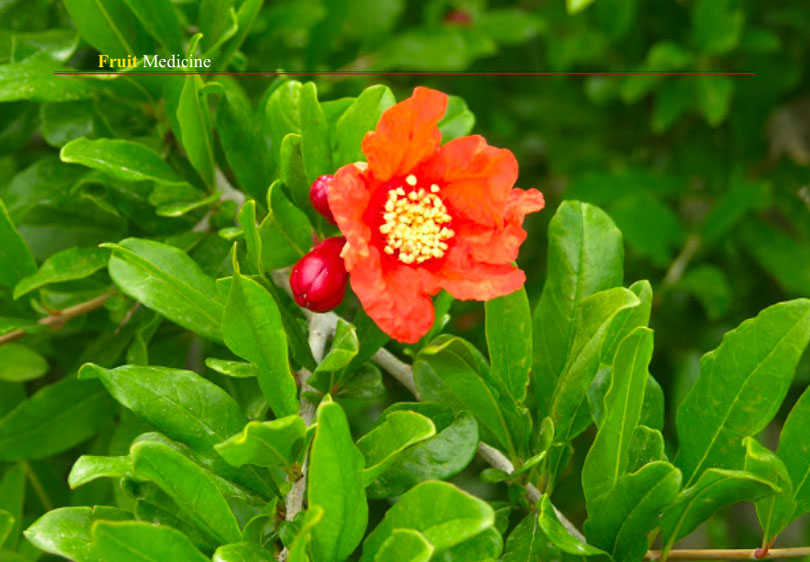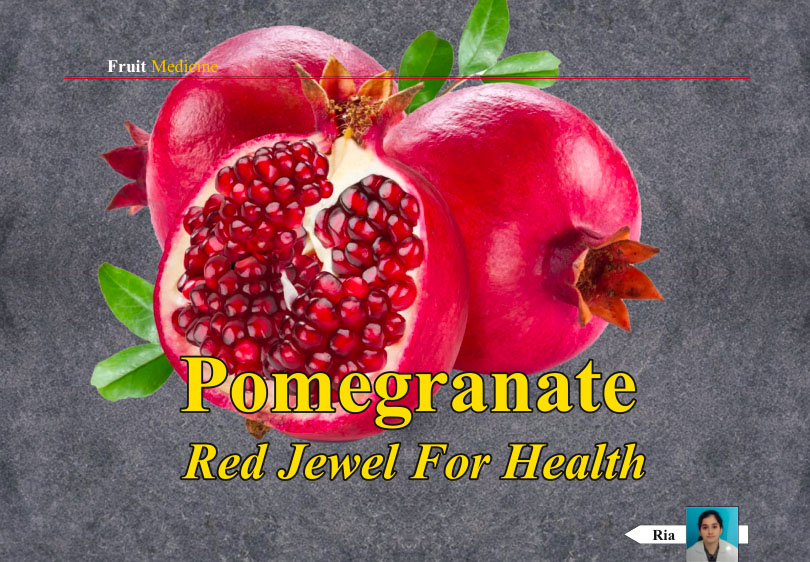The name pomegranate comes from Latin word “Pomum” meaning apple and granatum meaning full of seeds. It is one of the seven kinds of fruits mentioned in the Bible. Pomegranate juice improves blood flow and prevents the thickening of coronary arteries. It also slows the growth of plaque and deposition of cholesterol in the arteries. Pomegranate reduces the free radical damage and thus decrease the signs of ageing and wrinkles. Its seed oil protects against skin cancer.
Pomegranate is one of the seven kinds of fruits mentioned in The Bible. It sheds its leaves in winter and sprouts in early spring. It ripens at the end of summer very close to the beginning of the Jewish new year.
It is used for furnishing and as blessing in ceremonies. It decorated the temples in the past and had appeared on ancient coins. The most important growing regions of pomegranate are Egypt, China, Afghanistan, Pakistan, Bangladesh, Iran, Iraq, India, Burma and Saudi Arab.
The name pomegranate comes from Latin word “Pomum” meaning apple and granatum meaning full of seeds and its botanical name is Punica granatum. In Sanskrit it is known as Dadima and Anar in Hindi.
Description
It is neat round small tree that can grow to 20 to 30 ft. The trunk is covered by red brown bark which later becomes grey.
The pomegranate has glossy, leathery leaves that are narrow and lance shaped. The flowers are attractive scarlet and over an inch across.
The fruit has a thick leathery rind which protects the pulp and seeds inside. The inside of fruit is separated into compartments by white spongy tissue. It is red, round and looks like a red apple. The fruit is packed with plenty of nutrients, antioxidants which make it a part of healthy diet.

Composition of Pomegranate
About 50% of total fruit weight corresponds to peel which is important source of bioactive compounds such as flavinoids, phenolics, minerals like potassium, nitrogen, calcium, magnesium, sodium and complex polysaccharides. The edible part of fruit is 50% which consists of 40% arils and 10% seeds. The arils contain 85% water, 10% total sugar mainly fructose and glucose and 1.5% pectin, organic acid such as citric acid, ascorbic acid and malic acid.
Varieties
Based on taste- It is classified into 3 types
1. Sweet
It is indicated to be taken during fever. It relieves excessive thirst and burning sensation. It undergoes digestion very easily. It helps to relieve diarrhoea, ulcerative colitis and irritable bowel syndrome. It improves immunity and body strength.
2. Sweet sour
Its taste improves the digestion power of stomach. It helps to relieve anorexia. It slightly increases the pitta and also improve the taste of food.
3. Sour
Pomegranate fruit having predominant sour taste increases Pitta to a greater extent. But it balances Kapha and Vata.
HEALTH BENEFITS
Digestion
The bark and leaves are used to calm the disorders of digestive system. It provides B-complex vitamins that help body to convert fat, carbohydrates, proteins in the food into energy. It also plays a vital role in the secretion of enzymes.
Antioxidant
Pomegranate seeds get their vibrant red hue from polyphenoles. These chemicals are powerful antioxidants. Their juice helps remove free radicals, protects cells from damage and reduces inflammation.
Heart
Pomegranate juice improves blood flow and prevents the thickening of coronary arteries. It also slows the growth of plaque and deposition of cholesterol in the arteries.
Weight loss
Pomegranates are high in fibre which is one of the most important nutrients for sustainable weight loss. It is rich in antioxidant polyphenoles and conjugated linolenic acid which helps to burn fat and boost the metabolism. It also helps in suppressing the appetite.
Blood pressure
Pomegranate juice can help lower the blood pressure by reducing the level of angiotensin converting enzyme.
Anemia
It is rich in vitamin K, vitamin C, fibre and potassium. The high content of vit C helps the body to absorb the iron. Regular consumption of pomegranate helps to increase haemoglobin level and fights anemia.
Cancer
Pomegranate juice can inhibit the growth of tumor cells and induce natural death in them. Recent research has shown that pomegranate extract selectively inhibits the growth of breast, prostate and lung cancer cells. It has shown anti proliferative, anti metastatic and anti invasive effect on different cancers.
Fertility
Antioxidant property of pomegranate can improve the sperm quality. Its juice contains folic acid that boosts blood flow to the uterus and help in conception.
Skin
It reduces the free radical damage and thus decreases the signs of ageing and wrinkles. It stimulates the keratenocyte skin cells which help in cellular regeneration. Its seed oil protects against skin cancer.
Arthritis
The plant compounds in pomegranate have anti-inflammatory effect so that they could help treat arthritis. The extract can block the enzymes that are known to damage joints.

Nutritional Facts
Nutrient Value per 100 gm
Water 77.93g
Energy 83 Kcal
Protein 1.67 gm
Total lipid 1.17 gm
Carbohydrates 18.70 gm
Fibre 4 gm
Sugar 13.67 gm
Vitamins
Vit C (Ascorbic Acid) 10.2 mgm
Thiamine 0.067 mgm
Riboflavin 0.035 mgm
Niacin 0.293 mgm
Vit B6 0.075 mgm
Folate 38 mgm
Vit E 0.60 mgm
Vit K 16.4 mgm
Minerals
Calcium 10 mgm
Iron 0.30 mgm
Magnesium 12 mgm
Phosphorus 36 mgm
Potassium 236 mgm
Sodium 3 mgm
Zinc 0.35 mgm
Ayurvedic Energetics
Taste- Sweet, Sour, Astringent
Physical Property-Light
Potency- Unushana sheeta (Neither cold nor hot).
Parts used- Seeds, roots, flowers and leaves.
Therapeutic Uses of Pomegranate
Dysentery
The outer fruit cover of pomegranate is made into decoction (kwath) and administered 15 to 20 ml 3-4 times a day
Nasal bleeding
In nose bleeding the juice of the flowers is instilled nasally (Nasya) to arrest the bleeding.
Acidity
Being alkaloid it is a great antacid. Take 50 ml of pure juice two times daily on an empty stomach to relieve acidity. It soothens inflamed stomach.
Internal bleeding
In bleeding disorders, take pomegranate decoction prepared by boiling the fruit rind in water and simmering it before drinking.
Skin rashes
Juice of pomegranate can be applied in skin allergies, rashes and insect bites. It can be mixed with aloe vera gel in 1:1 ratio.
Burning eyes
Instill one drop of fresh or diluted pomegranate juice into each eye at bed time to alleviate burning sensation in eyes.
Cough in children
Half cup of pomegranate juice with a pinch of ginger powder and a pinch of pippali powder is given in children suffering from chronic cough.
Ayurvedic Formulations
1. Dadimadi Ghrita
2. Dadimadi Kwatha
3. Yavanyadi Churna
4. Dadimashtak Churna
5. Lawan Bhaskar Churna
6. Dadima Chatushn Churna
Pomegranates are known as the healthiest fruit as they have a wide range of benefits to keep our body disease free. Every part of it possesses beneficial properties, therefore it can be added to our diet.
Ria
Internee,
Dayanand Ayurvedic College, Jalandhar-8







 Dec 2024
Dec 2024
 May 2024
May 2024
 September 2022
September 2022
 April 2022
April 2022
 October 2020
October 2020
 Jan 2020
Jan 2020
 June 2019
June 2019
 January-February 2019
January-February 2019
 Augest-September
Augest-September
 April 2018
April 2018
 November 2017
November 2017
 June 2017
June 2017
 November 2016
November 2016
 September 2015
September 2015
 March 2015
March 2015
 July 2014
July 2014
 January 2014
January 2014
 July2013
July2013
 March 2013
March 2013
 May 2012
May 2012
 May 2011
May 2011
 Sep 2010
Sep 2010
 Jun 2010
Jun 2010
 Feb 2010
Feb 2010
 December 2009
December 2009
 August 2009
August 2009
 June 2009
June 2009
 Feb 2009
Feb 2009
 December 2008
December 2008
 October 2008
October 2008
 March 2008
March 2008
 July 2008
July 2008
 May 2008
May 2008